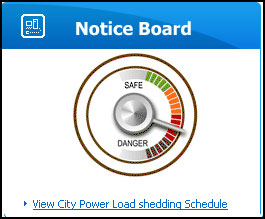- Home
- Deceptions
- Solar
- Thermal Audit
- Ventilation
- Sensors
- Governance
- Environment
- Reference
- Contact
- News
Load Shedding
Energy Alternatives for Newfoundland
Oil production is approximately at peak levels and will decline resulting in permanently high fuel prices. It is not practical to balance the decline in oil production by increasing the use of wind turbines or silicon solar cells because of the enormous energy required to manufacture the new equipment. For example, before a wind turbine can produce power, steel must be mined and processed to manufacture the tower, aluminum for the blades, copper for the windings etc. All this energy must be expended up front -- and it all comes from fossil fuels. That isn't to say it is imposible -- it is just highly unlikely that any country will divert their war budget into alternate energy, ban unnecessary driving, ration fuel and put all spare capacity into creating new infrastructure. Nothing short of a threat from aliens would get humankind to work together in a massive scale for the common good, although Adolf came close. Therefore, most countries will be faced with electricity shortages - not because there isn't any oil or coal left but because they can no longer afford the fuel to keep plants operating. This is happening now in Pakistan.

Newfoundland is fortunate to have undeveloped hydroelectric sites, both large and small (micro hydro), however the development costs are enormous. Even without conservation (e.g. solar passive homes), and assuming large population growth (unlikely) there are two solutions for inadequate generation capacity or excessive power demand that do not require building new power plants.
- Remote control of hot water tanks and central air conditioning
- Scheduled power interruptions
Remote controlled switches are commonly fitted to central air-conditioner units, and in return for allowing the utility company to turn off the unit, customers are given a small monthly discount of around $4. The disconnects can be rotated through the community so that cooling isn't interupted for more than an hour. This could be extended to hot water tanks.
The second method is to have a blackout schedule, much like a garbage collection schedule, and commonly referred to as "load shedding". If there is a critical period where demand cannot be met, then customers get notified by cellphone text message, e-mail or the internet and power will be cut during their scheduled blackout period. For example, if it is extremely cold, and the shedding period for your street is M,W,F from 6pm to 7pm then there is a good chance you will have a power interruption.

The image above is from a South African power company web site. If the indicator gets into the danger zone, you can assume the power company will use your blackout timeslot.
An appropriate alternative for Newfoundland would be to use put all electric heating loads onto remote controlled relays so that the blackout would be an "electric heating" blackout. This way there would be no digital clocks to reset and you can continue to enjoy the hockey game.
Load shedding is a nussiance, but in many cases it is a far better option than carrying billions in public debt from the financing of mega power projects, paying higher taxes and facing cutbacks in essential services. The best option of course is to eliminate demand by moving towards solar passive homes and replacing electric heat with geothermal and leave load shedding for emergencies like failure of the Bay d'Espoir hydroelectric generators or the physical collapse of transmission lines from a winter ice storm.
Reducing Peak Power vs Reducting Energy
Load shedding is a form of rationing that always works to reduce peak loading, but doesn't necessairly reduce energy usage. For example, you can cut the power to a hot water tank for a few hours but when power is restored, that same tank will switch on longer than usual and reheat the water. People are also creative and will buy ininterruptable power supplies for the electronics that increase overall energy usage, much like rationing water in the afternoon would just have people filling bathtubs at noon.
The shifting of peak loads can also be accomplished by charging more for peak power, but this primairly hurts the poor who can't figure out how to beat system or pay electricians to install automatic switches to ensure that water heaters use off-peak power. The poor suffer higher rates, the wealthy don't care and those in between can keep costs down with dilligence and planning.
Another possibility is to increase rates until people stop using electricity, which is in effect rationing by wealth.
So bottom line: Load shedding is a useful tool to ensure the stability of the power grid, affects everyone equally, doesn't increase rates but ideally one that would never to be used.
